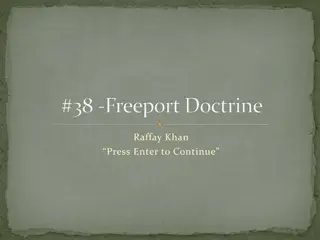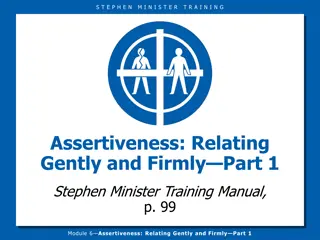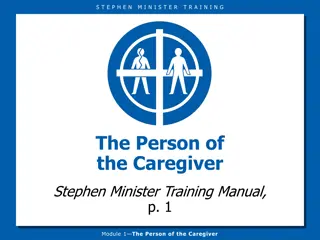The Trials of the Rich: An Insightful Analysis by Stephen Leacock
Stephen Leacock reflects on his observations of the wealthy, debunking common misconceptions about their lifestyle. He delves into the financial burdens, societal pressures, and perceived hardships faced by the rich, contrasting them with the contentment found within more modest means. Through witty anecdotes and sharp insights, Leacock challenges conventional notions of wealth and happiness.
Download Presentation

Please find below an Image/Link to download the presentation.
The content on the website is provided AS IS for your information and personal use only. It may not be sold, licensed, or shared on other websites without obtaining consent from the author. Download presentation by click this link. If you encounter any issues during the download, it is possible that the publisher has removed the file from their server.
E N D
Presentation Transcript
BY STEPHEN LEACOCK Prepared by V.Lydia Vedam, M.A , M.Ed Lecturer in English
Let me admit at the outset that I write this essay without adequate material. I have never known, I have never seen, any rich people. Very often I have thought that I had found them. But it turned out that it was not so. They were not rich at all. They were quite poor. They were hard up. They were pushed for money. They didn't know where to turn for ten thousand dollars. In all the cases that I have examined this same error has crept in. I had often imagined, from the fact of people keeping fifteen servants, that they were rich. I had supposed that because a woman rode down town in a limousine(vehicle) to buy a fifty-dollar hat, she must be well-to-do. Not at all. All these people turn out on examination to be not rich. They are cramped(packed). They say it themselves. Pinched, I think is the word they use. When I see a glittering group of eight people in a stage box at the opera, I know that they are all pinched. The fact that they ride home in a limousine has nothing to do with it.
A friend of mine who has ten thousand dollars a year told me the other day with a sigh that he found it quite impossible to keep up with the rich. On his income he couldn't do it. A family that I know who have twenty thousand a year have told me the same thing. They can't keep up with the rich. There is no use in trying. A man that I respect very much who has an income of fifty thousand dollars a year from his law practice has told me with the greatest frankness that he finds it absolutely impossible to keep up with the rich. He says it is better to face the brutal fact of being poor. He says he can only give me a plain meal, what he calls a home dinner--it takes three men and two women to serve it--and he begs me to put up with it.
As far as I remember, I have never met Mr. Carnegie. But I know that if I did he would tell me that he found it quite impossible to keep up with Mr. Rockefeller. No doubt Mr. Rockefeller has the same feeling. On the other hand there are, and there must be, rich people somewhere. I run across traces of them all the time. The janitor(care taker) in the building where I work has told me that he has a rich cousin in England who is in the South Western Railway and gets ten pounds a week. He says the railway wouldn't know what to do without him. In the same way the lady who washes at my house has a rich uncle. He lives in Winnipeg and owns his own house, clear, and has two girls at the high school. But these are only reported cases of richness. I cannot vouch(assure) for them myself. When I speak therefore of rich people and discuss whether they are happy, it is understood that I am merely drawing my conclusions from the people that I see and know. My judgment is that the rich undergo cruel trials and bitter tragedies of which the poor know nothing.
In the first place I find that the rich suffer perpetually(always) from money troubles. The poor sit snugly(easily) at home while sterling exchange falls ten points in a day. Do they care? Not a bit. An adverse balance of trade washes over the nation like a flood. Who have to mop(sweep) it up? The rich. Call money rushes up to a hundred per cent, and the poor can still sit and laugh at a ten cent moving picture show and forget it. But the rich are troubled by money all the time. I know a man, for example--his name is Spugg--whose private bank account was overdrawn last month twenty thousand dollars. He told me so at dinner at his club, with apologies for feeling out of sorts. He said it was bothering him. He said he thought it rather unfair of his bank to have called his attention to it. I could sympathise, in a sort of way, with his feelings. My own account was overdrawn twenty cents at the time.
I knew that if the bank began calling in overdrafts it might be my turn next. Spugg said he supposed he'd have to telephone his secretary in the morning to sell some bonds and cover it. It seemed an awful thing to have to do. Poor people are never driven to this sort of thing. I have known cases of their having to sell a little furniture, perhaps, but imagine having to sell the very bonds out of one's desk. There's a bitterness about it that the poor can never know. With this same man, Mr. Spugg, I have often talked of the problem of wealth. He is a self-made man and he has told me again and again that the wealth he has accumulated is a mere burden to him. He says that he was much happier when he had only the plain, simple things of life
. Often as I sit at dinner with him over a meal of nine courses, he tells me how much he would prefer a plain bit of boiled pork, with a little smashed turnip. He says that if he had his way he would make his dinner out of a couple of sausages, fried with a bit of bread. I forget what it is that stands in his way. I have seen Spugg put aside his glass of champagne--or his glass after he had drunk his champagne-- with an expression of something like contempt. He says that he remembers a running creek at the back of his father's farm where he used to lie at full length upon the grass and drink his fill. Champagne, he says, never tasted like that. I have suggested that he should lie on his stomach on the floor of the club and drink a saucerful of soda water. But he won't.
I know well that my friend Spugg would be glad to be rid of his wealth altogether, if such a thing were possible. Till I understood about these things, I always imagined that wealth could be given away. It appears that it can not. It is a burden that one must carry. Wealth, if one has enough of it, becomes a form of social service. One regards it as a means of doing good to the world, of helping to brighten the lives of others, in a word, a solemn trust. Spugg has often talked with me so long and so late on this topic--the duty of brightening the lives of others--that the waiter who held blue flames for his cigarettes fell asleep against a door post, and the chauffeur outside froze to the seat of his motor. Spugg's wealth, I say, he regards as a solemn trust.
I have often asked him why he didn't give it, for example, to a college. But he tells me that unfortunately he is not a college man. I have called his attention to the need of further pensions for college professors; after all that Mr. Carnegie and others have done, there are still thousands and thousands of old professors of thirty-five and even forty, working away day after day and getting nothing but what they earn themselves, and with no provision beyond the age of eighty-five. But Mr. Spugg says that these men are the nation's heroes. Their work is its own reward. But after all, Mr. Spugg's troubles--for he is a single man with no ties-- are in a sense selfish. It is perhaps in the homes--or more properly in the residences--of the rich that the great silent tragedies are being enacted every day--tragedies of which the fortunate poor know and can know nothing.
I saw such a case only a few nights ago at the house of the Ashcroft-Fowlers, where I was dining. As we went in to dinner, Mrs. Ashcroft-Fowler said in a quiet aside to her husband, "Has Meadows spoken?" He shook his head rather gloomily(thickly) and answered, "No, he has said nothing yet." I saw them exchange a glance of quiet sympathy and mutual help, like people in trouble, who love one another. They were old friends and my heart beat for them. All through the dinner as Meadows--he was their butler-- poured out the wine with each course, I could feel that some great trouble was impending over my friends.
After Mrs. Ashcroft-Fowler had risen and left us, and we were alone over our port wine, I drew my chair near to Fowler's and I said, "My dear Fowler, I'm an old friend and you'll excuse me if I seem to be taking a liberty. But I can see that you and your wife are in trouble." "Yes," he said very sadly and quietly, "we are." "Excuse me," I said. "Tell me--for it makes a thing easier if one talks about it--is it anything about Meadows?" "Yes," he said. "It is about Meadows." There was silence for a moment, but I knew already what Fowler was going to say. I could feel it coming."Meadows," he said presently, constraining himself to speak with as little emotion as possible, "is leaving us." "Poor old chap!" I said, taking his hand. "It's hard, isn't it?" he said. "Franklin left last winter--no fault of ours; we did everything we could--and now Meadows."
There was almost a sob(sadness) in his voice. "He hasn't spoken definitely as yet," Fowler went on, "but we know there's hardly any chance of his staying." "Does he give any reason?" I asked. "Nothing specific," said Fowler. "It's just a sheer case of incompatibility. Meadows doesn't like us." He put his hand over his face and was silent. I left very quietly a little later, without going up to the drawing room. A few days afterwards I heard that Meadows had gone. The Ashcroft- Fowlers, I am told, are giving up in despair. They are going to take a little suite of ten rooms and four baths in the Grand Palaver Hotel, and rough it there for the winter. Yet one must not draw a picture of the rich in colours altogether gloomy. There are cases among them of genuine, light-hearted happiness.
"Poor old Edward Overjoy!" he said, as the motor moved out of sight. "What's wrong with him?" I asked. "Hadn't you heard?" said my friend. "He's ruined--absolutely cleaned out--not a cent left." "Dear me!" I said. "That's awfully hard. I suppose he'll have to sell that beautiful motor?" My friend shook his head. "Oh, no," he said. "He'll hardly do that. I don't think his wife would care to sell that." My friend was right. The Overjoys have not sold their motor. Neither have they sold their magnificent sandstone residence. They are too much attached to it, I believe, to sell it. Some people thought they would have given up their box at the opera. But it appears not. They are too musical to care to do that. Meantime it is a matter of general notoriety that the Overjoys are absolutely ruined; in fact, they haven't a single cent. You could buy Overjoy--so I am informed--for ten dollars. But I observe that he still wears a seal-lined coat worth at least five hundred.
I have observed that this is especially the case among those of the rich who have the good fortune to get ruined, absolutely and completely ruined. They may do this on the Stock Exchange or by banking or in a dozen other ways. The business side of getting ruined is not difficult. Once the rich are ruined, they are--as far as my observation goes--all right. They can then have anything they want. I saw this point illustrated again just recently. I was walking with a friend of mine and a motor passed bearing a neatly dressed young man, chatting gaily with a pretty woman. My friend raised his hat and gave it a jaunty and cheery swing in the air as if to wave goodwill and happiness.























